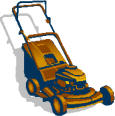Types of mulches
There are two kinds of mulches, organic
and inorganic ones. Organic mulches are created from natural
substances and help enhance the soil via decomposition.
 Lawn clippings
can be used when the mowing season begins. This type of mulch
should be dried thoroughly before being used since it has a
tendency to mat when spread thick if it is not dry. Grass is
nitrogen rich and is ideal when used as a vegetable mulch. Don't
use clippings that have been sprayed with herbicide. A grass
clipping catcher attachment is quite handy.
Lawn clippings
can be used when the mowing season begins. This type of mulch
should be dried thoroughly before being used since it has a
tendency to mat when spread thick if it is not dry. Grass is
nitrogen rich and is ideal when used as a vegetable mulch. Don't
use clippings that have been sprayed with herbicide. A grass
clipping catcher attachment is quite handy.
Hardwood and pine bark mulches are quite popular.
Some types of fungus seem to prefer hardwood mulches, but this
usually only occurs after prolonged wet spells, and other than
being unsightly for a short time, is usually harmless.
When used properly, hardwood mulches don't deplete the soil
of nitrogen, which could happen if the mulch is mixed with the
soil and decays under the surface. A 1 inch top dressing of
shredded hardwood mulch will almost completely break down.
Keep them away from the very base of plants or they could
cause rot, especially on smaller plants, which is why mulches
work best around trees and shrubs.
Pine bark mulch should only be used around plants that
prefer an acid soil. Long term use can acidify the soil to a point
where plants won't do well. Your nursery person can guide you
here.
Mulches should be heavy enough to not float or blow away.
Chunks of bark, however, allow too many weeds and encourage many
pests, so they don't really make the best mulch.
Mushroom soil is a great conditioner and mulch. Compared
with hardwood mulch, it is not as readily consumed by earthworms
and fungi, so it lasts a lot longer
Sawdust is
also easily obtained in most areas. It is a good idea to let it
decompose after mixing it with a small amount of soil to prevent
it from getting blown away when dry or matting when wet. Nitrogen
in the soil may be lessened if fresh sawdust is introduced into
the soil but if the sawdust is just on the upper portion of the
soil, this will not be a problem.
Straw is
what is left of the stem of grains that have been harvested.
Because of its light weight, you may have some trouble applying
it. It needs to be replaced more often since it decomposes
quickly. It is a good choice for areas that have been newly
seeded.
 Compost created from Grass Clippings
break down quickly and contain as much nitrogen as manure.
(Avoid grass clippings that contain pesticide or herbicide
residue)
Compost created from Grass Clippings
break down quickly and contain as much nitrogen as manure.
(Avoid grass clippings that contain pesticide or herbicide
residue)
Kitchen scraps like melon rinds,
carrot peelings, tea bags, apple cores, banana peels work well.
You can successfully compost all forms of kitchen waste.
However, meat, meat products, dairy products, and high-fat foods
like salad dressings and peanut butter are very slow, but will
eventually decompose.
An inorganic mulch like Plastic
sheets, makes the soil warm and prevents air and water from
penetrating or getting out of it and it does not decompose The
plant's growth is accelerated by the additional heat and moisture.
Due to its solid characteristics, plastic mulches need an
irrigation system.
These are some of the mulches that you can
use for landscaping. Plan carefully and decide which kind of mulch
to use based on the appearance and needs of your landscaping
project. Go ahead and make your dream lawn a reality!